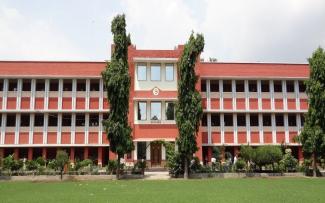
IN Delhi University recently, an ABVP mob demonstrated outside an Academic Council meeting, demanding that the DU VC “hand over” certain professors to them. These professors were the ones responsible for including anti-communal, anti-caste, and queer content in the syllabi of the English Department as well as History and Political Science. Seven professors had to be secretly escorted out of the VC’s office, to avoid the lynch mob baying for their blood outside.
The RSS student outfit, as well as its teachers’ counterpart NDTF, objected to a short story “Manibein alias Bibijan” — set in the Gujarat riots of 2002. The story, introduced in the BA Third Year syllabus 15 years ago, referred to violence against Muslims by RSS outfits in Gujarat when Modi was CM.
They also objected to a paper on caste in literature, and a course on ‘Interrogating Queerness’ which included a text by Ruth Vanita on“Same Sex Love in India”, which referenced figures from Indian mythology and Puranic texts. The representative of NDTF who raised these objections said that he would not mind if it is taught in another country, “But in a Hindu samaj [society] this won’t be accepted.”
Forced to accept several of these changes, Saikat Ghosh, an Assistant Professor of the English department and an Academic Council member who was among those against ABVP had raised violent slogans, said, “We had all the arguments in favour of the syllabus that we had proposed. But they had the might. And in today's India, the might is always right.”
JNU’s Iconic Wall Posters Destroyed
The JNU Administration has destroyed students’ wall posters that are a defining feature of JNU, claiming that these ‘deface’ the walls and violate a law against ‘defacement’ of walls.
JNU was established in 1969. A story on Delhi’s architecture in the Indian Express last year carried an anecdote shared by JNU’s architect CP Kukreja’s family members:
“Vice Chancellor G Parthasarathi was at his office in Jawaharlal Nehru University (JNU) when architect CP Kukreja rushed inside. It was the first student election on campus in 1971 and the newly-done brick buildings were plastered with posters. They will spoil the building, he lamented. The mild-mannered Parthasarathi replied, “This is a campus in a democracy. Let the buildings speak to the students. Let it become their canvas.”
Why did the current Sanghi Administration of JNU suddenly decide that JNU’s walls must be free of posters? The answer lies in a November 2015 cover story of the RSS Hindi organ Panchjanya, titled ‘JNU: Citadel of Divisiveness’. In that cover story, a story by one Ashwini Mishra had objected to the presence of “human rights, women’s rights, religious freedom, discrimination and exclusion, sexual justice and secularism” in the JNU curriculum as well as on the JNU wall posters. The article had said that student activists achieve their aims with the help of “secularism, minority rights, human rights, women’s rights and the rights of deprived sections of society” – and that “the flourishing crop of such poison can be seen all over the University in the slogans, posters and pamphlets that cover its walls” that “seek to divide Indian culture, civilisation and society.” Well, now the JNU VC is implementing the RSS agenda, and ridding JNU walls of the posters on secularism and rights of minorities, women, and deprived sections, which are “poison” to the RSS minds.
Ever since this order has been carried out, generations of JNU students are recalling how the posters shaped their campus and their academic climate. Below are excerpts from an Open Letter penned by the JNUSU President Sai Balaji (which was published in Live Wire).
Liberation Archive
- 2001-2010
-
2011-2020
- 2011
- 2012
- 2013
- 2014
- 2015
- 2016
- 2017
- 2018
-
2019
- JANUARY-2019
- FEBRUARY-2019
- MARCH-2019
- APRIL-2019
- May-2019
- LIBERATION, JUNE 2019
- Liberation JULY 2019
-
LIBERATION, August 2019
- August 15, 2019: Reclaim the Spirit of the Freedom Movement to Foil the Fascist Design of the Modi Government
- Stop Mob Lynching! Guarantee Justice for Tabrez!
- Modinomics 2.0 and Bahi-Khata 2019
- Protest against Railway Privatisation and Corporatisation
- Sovereign Foreign Debt: Is the Government Paving the Way for India's Bankruptcy?
- 'If People are Lynched for Not Saying Jai Shree Ram, I Will Certainly Protest'
- Delhi Factory Fires
- Sewer Deaths And The Robot Lie
- Wolf in Granny's Clothing: Exclusion Masquerades as Education
- Quality in School Education Cannot be Addressed Through Volunteerism
- Flood Havoc in Assam and Bihar
- Modi Regime Fans Islamophobia, Cracks Down On Rights
- In Solidarity With Miyah Poets
- Fresh Attacks On Universities -- DU Syllabus: Might Is Right
- An Open Letter From the Walls of JNU
- German Envoy Touches Feet Of Golwalkar's Statue At RSS HQ
- Draconian And Anti-Democratic Amendments To Laws
- Second Monthly London Vigil Against Fascism And Hindu Supremacy in India
- Sonbhadra: Adivasis Massacred With Police and Government Complicity
- Santosh Rana (1942-2019): Tireless Fighter For Dignity and Democracy for the Oppressed
- Red Salute To Comrade AK Roy
- Every Second ST, Every Third Dalit And Muslim In India Is Multi-Dimensionally Poor - Global MPI Index
- CPIML Appeal: Contribute to Flood Relief in Bihar and Assam
- Liberation, SEPTEMBER 2019
- Liberation, OCTOBER 2019
- Liberation, NOVEMBER 2019
- Liberation, DECEMBER 2019
- 2020
- 2021-2030
Charu Bhawan, U-90, Shakarpur, Delhi 110092
Phone: +91-11-42785864 | Fax:+91-11-42785864 | +91 9717274961
E-mail: info@cpiml.org







